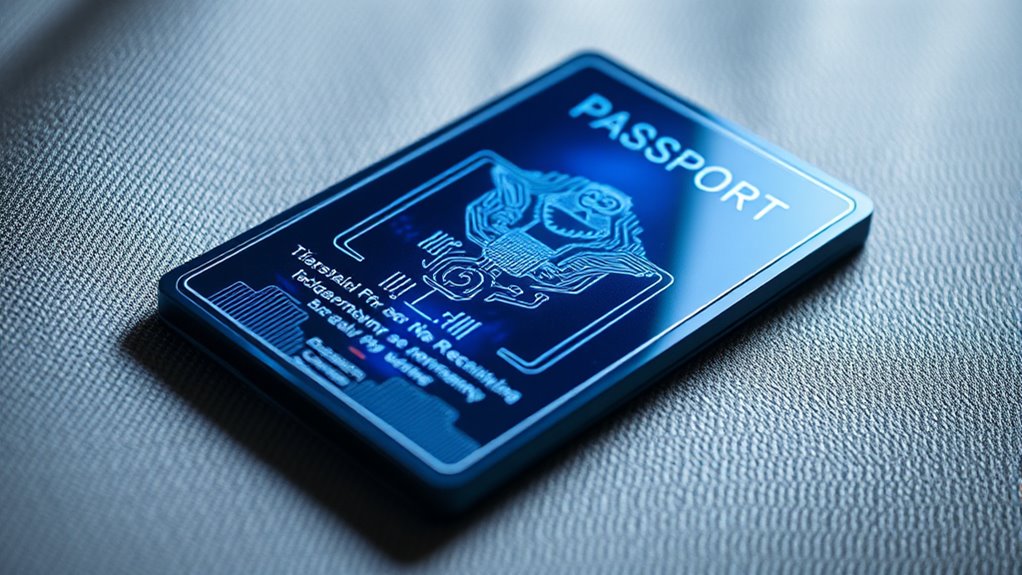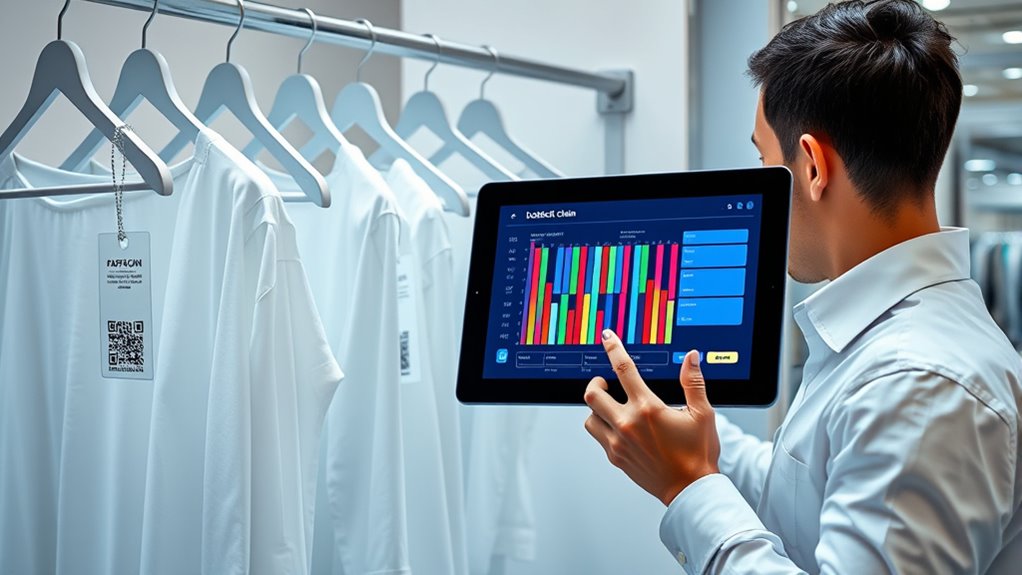Fashion supply chain transparency is now clearer thanks to digital passports and blockchain technology. These tools give you detailed, verified information about each garment’s journey from raw materials to your closet. Digital passports store data on origin, manufacturing, and ethical practices, while blockchain creates an unalterable record of every step. This guarantees brands are held accountable and helps you make more informed, responsible choices. If you’re interested, you’ll discover how these innovations are shaping a more ethical industry.
Key Takeaways
- Digital passports provide comprehensive, verified data on a garment’s origin, manufacturing, and ethical standards, enhancing transparency.
- Blockchain technology creates secure, unalterable records of every supply chain transaction, ensuring product integrity.
- Transparency tools empower consumers to make informed choices based on verified sustainability and ethical practices.
- Brands can verify supplier compliance with social and environmental standards, reducing risks of unethical labor and environmental violations.
- Adopting digital passports and blockchain fosters a responsible fashion industry focused on accountability and sustainable sourcing.

Have you ever wondered where your clothes really come from? It’s easy to overlook the journey each garment takes before it reaches your closet. But increasingly, brands are making that journey more transparent through innovative tools like digital passports and blockchain technology. These advancements aim to give you a clearer view of the supply chain, so you can make more informed choices. At the core of this movement is a focus on sustainable sourcing and ethical labor. When companies commit to these principles, they’re ensuring that the materials used are responsibly sourced and that workers are treated fairly throughout production. Digital passports serve as a kind of digital identity for each item, capturing detailed information about its origin, manufacturing processes, and compliance with social and environmental standards. Instead of relying on vague labels or marketing claims, you can access verified data about how your clothes were made. Blockchain technology takes this a step further by creating an unchangeable record of every transaction along the supply chain. This means each step—from raw material extraction to final assembly—is securely documented, making it nearly impossible to falsify or hide unethical practices. As a consumer, you gain confidence that the products you buy align with your values. Brands that adopt these transparency tools often work closely with suppliers committed to sustainable sourcing, ensuring that raw materials are obtained without damaging ecosystems or exploiting communities. They also prioritize ethical labor practices, providing fair wages, safe working conditions, and respecting workers’ rights. Thanks to blockchain, you can see whether factories adhere to these standards and whether any violations have occurred. This level of insight shifts power towards you as a buyer, encouraging brands to uphold higher standards to maintain trust. additionally, digital passports and blockchain can foster accountability across the entire supply chain. Suppliers and manufacturers are incentivized to meet ethical and environmental benchmarks because their compliance is recorded transparently and permanently. In turn, this helps combat issues like child labor, forced labor, and environmental degradation. As more brands embrace these technologies, the fashion industry is gradually moving toward a future where transparency isn’t just a marketing buzzword but a fundamental part of ethical business. You’re empowered to make conscious choices, knowing that your clothing supports sustainable sourcing and ethical labor practices. Furthermore, understanding the Candles subtopic related to materials and techniques can inspire sustainable practices in other industries, including fashion. Ultimately, these innovations aren’t just about technology—they’re about building a more responsible fashion industry that values people and the planet just as much as style.
Frequently Asked Questions
How Secure Are Digital Passports Against Counterfeiting?
Digital passports are highly secure against counterfeiting because they use advanced blockchain technology, which guarantees authenticity verification is tamper-proof. You can trust these digital solutions for counterfeit prevention, as each passport is unique and encrypted, making duplication nearly impossible. This technology provides a reliable way to confirm a product’s origin and authenticity, giving you confidence in your purchases and helping to combat counterfeit items effectively.
What Are the Costs Associated With Implementing Blockchain for Transparency?
Implementing blockchain for transparency is like planting a garden—initial costs can be high, but the long-term benefits grow steadily. You’ll face costs related to technology, training, and system integration, which form part of a detailed cost analysis. Expect implementation challenges such as data standardization and stakeholder buy-in. While upfront expenses are significant, this investment enhances accountability and reduces counterfeit risks, making your supply chain more trustworthy.
How Do Digital Passports Impact Consumer Privacy?
Digital passports can raise privacy concerns because they may collect and store your consumer data throughout the supply chain. While they aim to increase transparency, you might worry about how your personal information is used or shared. It’s important to stay informed about data protection policies and make sure that your privacy concerns are addressed by brands implementing digital passports, so your personal data remains secure and your privacy is protected.
Can Small Brands Afford Blockchain Technology?
Small brands often face affordability concerns when it comes to blockchain technology, but adoption is becoming more feasible. Costs are decreasing, and there are emerging solutions tailored for smaller businesses. You can explore cost-effective platforms and collaborate with tech providers to implement digital passports without breaking the bank. While initial investments might seem high, the long-term benefits for transparency and consumer trust can make blockchain a worthwhile choice.
What Are the Legal Implications of Blockchain in Fashion Supply Chains?
You need to take into account that blockchain in fashion supply chains raises legal issues around intellectual property and regulatory compliance. You might face challenges protecting your designs and data shared on the blockchain, risking infringement. Additionally, you must ensure adherence to laws like data privacy regulations, which vary across regions. Staying informed about evolving legal standards helps you avoid penalties and safeguard your brand’s integrity in this digital landscape.
Conclusion
By embracing digital passports and blockchain, you can boost transparency, build trust, and brave the barriers of opacity. These technologies transform tedious tracking into a seamless, secure system, shining a spotlight on sustainability and ethical practices. So, step into the future of fashion with confidence, clarity, and commitment. Let transparency thrive, technology transform, and your brand stand out by showcasing your sincere support for a sustainable, socially responsible supply chain.









